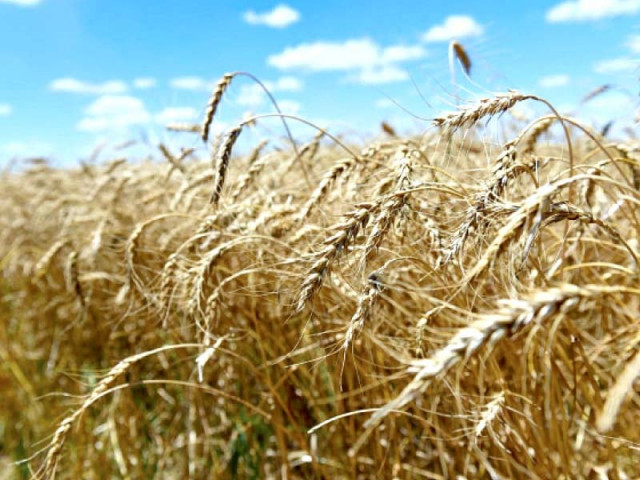Wheat support price decision put off
Govt delays 25% price increase due to inflationary implications, political uncertainty

For the second time in less than a week, the federal government on Monday put off decision on a proposed 25% increase in the minimum wheat support price due to its inflationary implications and a charged political atmosphere.
The Ministry of National Food Security and Research had proposed an increase in the support price to incentivise farmers to produce more as it projected annual wheat consumption of over 30 million tons in five years - an increase of 8% over current levels.
The Economic Coordination Committee (ECC) of the cabinet instead decided to constitute a small committee comprising ministers and special aides to decide whether to increase the support price from Rs1,400 per 40 kg to Rs1,745, up 25%.
However, the price of Rs1,745 will be only higher by Rs158 compared to the estimated production cost of Rs1,587 per 40 kg, giving a profit margin of less than 10%.
A majority of ECC members opposed the increase in price by Rs345 and some did not support any increase at all, including Railways Minister Shaikh Rashid Ahmed, said sources. They suggested that the price should be set at Rs1,650 per 40 kg, giving a profit margin of 4% or Rs63.
They apprehended that the consequent increase in wheat flour prices could provide fuel to the opposition parties, which had already made inflation a big issue against the government. According to various studies, a 10% increase in the wheat support price leads to a rise of 2-3% in the overall inflation.
Against the current support price of Rs1,400, the price in the domestic market, as reported by the Pakistan Bureau of Statistics, stood at Rs2,256.6 per 40 kg in the first week of October, according to official documents.
The food ministry estimated the cost of production at Rs1,587 per 40 kg, an increase of Rs237 or 17.5% within six months. In March this year, when the food ministry had proposed support price of Rs1,400, it had estimated the wheat production cost at Rs1,350. The ministry proposed a 10% profit margin for farmers with wheat price at Rs1,587 per 40 kg. Average per-acre yield is estimated at 28 maunds.
Official estimates showed that the cost of fertilisers accounted for 20% of the total production cost. Land preparation cost was estimated at 10%, seed and sowing operations 15%, harvesting and thrashing 17% and land rent about 39%.
“The ECC decided to form a committee with Syed Fakhar Imam, Dr Abdul Hafeez Shaikh, Dr Ishrat Husain, Dr Waqar Masood, Nadeem Babar, Abdul Razak Dawood, Asad Umar and Khusro Bakhtiar as members to thoroughly evaluate the proposal of increase in the minimum support price of wheat for the 2020-21 crop,” according to the finance ministry.
The Ministry of National Food Security briefed the ECC on different estimates gathered from Punjab, Khyber-Pakhtunkhwa, Balochistan and the federal capital about price trends, it added.
The food ministry estimated current wheat consumption, including seed requirement, at nearly 28 million tons. Its estimates showed that the annual wheat requirement for a projected population of 240 million by 2025 would be over 30 million tons, an increase of 8% in five years.
It was highlighted that there was a need to increase the support price to support farmers and grow enough crop in the next sowing season, stated the finance ministry.
The committee also discussed the need for rationalising prices of inputs for making them more affordable for the farmers, supporting the rural economy through various measures and increasing wheat supply so that flour prices were brought down, it added. It was discussed to have a better system for gathering data of the agriculture sector.
The committee would also frame a proposal for fertiliser subsidy, mainly for di-ammonium phosphate (DAP), which may be offered as part of a package to the farmers so that their input cost was reasonable/ reduced. It was decided that provinces should increase wheat releases to stabilise/ reduce flour prices in the market.
It was decided that local governments would be directed to specially monitor prices of wheat and flour in the market so that the rates did not escalate. The committee will present its proposals in the next ECC meeting.
Pakistan is among top 10 wheat-producing countries in the world, however, its large and growing population along with climate change is posing an unequivocal challenge. It is, therefore, imperative to consistently enhance wheat production to not only satisfy rising demand but also ensure food security. There was also disagreement among provinces over the wheat support price. Punjab - the largest wheat producer - wanted the price to be Rs1,650 per 40 kg, while Sindh - the second-largest producer - did not give a price.
It was decided that the federal government would approach Sindh chief minister to get its viewpoint.
The Khyber-Pakhtunkhwa government wanted Rs1,880 to be set as the support price and Balochistan was in favour of Rs1,700. For this season’s crop, the federal government had increased the wheat procurement price from Rs1,300 to Rs1,400 per 40 kg, an increase of 7.7%.
The ECC approved, in principle, the procedure for registration under the concessionary regime of electricity, re-gasified liquefied natural gas (RLNG) and domestic gas for the export-oriented sectors (erstwhile zero-rated sectors) with instructions to ensure better targeting of recipients of this subsidy. The ECC decided that the previous list of manufacturers or exporters declared zero-rated by the Federal Board of Revenue (under condition (xii) of SRO 1125) may be adopted for the export-oriented sectors.
Published in The Express Tribune, October 20th, 2020.
Like Business on Facebook, follow @TribuneBiz on Twitter to stay informed and join in the conversation.



















COMMENTS
Comments are moderated and generally will be posted if they are on-topic and not abusive.
For more information, please see our Comments FAQ